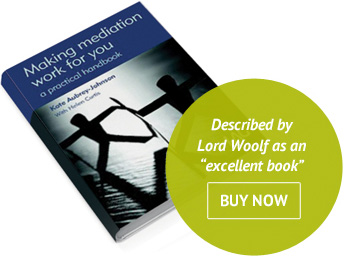BLOG
Mediate your Dispute!
June 29, 2016
Most people who find themselves in a dispute want to find a solution as quickly, cheaply and easily as possible. Litigation is rarely that solution: disputes can take over parties’ lives and the cost is high, in terms of money, time and wellbeing. Whatever the value or the complexity of the dispute, it is likely to be suitable for mediation. If a solution is reached, as it usually is, mediation will have saved significant amounts in legal costs and anxiety.
Civil mediation is a voluntary process. The first stage is to engage the other parties. Sometimes one party proposes mediation; sometimes a Judge will suggest it. Mediation can happen at any point: before litigation is commenced, or any time up to trial. Obviously the earlier mediation takes place, the greater the saving of potential legal costs.
A mediation provider can explain how mediation works and its advantages and liaise between the parties when arranging a mediation. Mediation is always confidential, which is attractive for parties wishing to avoid publicity and/or protect their reputation. Once everyone has agreed to mediate, the parties will agree on the identity of a mediator.
Preparation for mediation is important. The parties agree which documents they wish the mediator to see. Usually the mediator only needs a small bundle containing the issues and any relevant legal documents. Parties are also asked for a short position statement in advance of the mediation which is exchanged between the parties. It includes the party’s current view of the dispute, the impact it is having on them and any ideas for possible solutions. Additionally, confidential information can be sent by one or other party to be seen only by the mediator.
What is discussed in the mediation remains confidential and cannot be referred to in subsequent court proceedings. The mediator is a neutral facilitator, not a judge and does not give legal advice. His or her job is to enable parties to take decision-making into their own hands so as to find their own solutions. The mediator encourages constructive discussion, listens and helps shift parties’ perceptions.
A mediation can be completed in one day, sometimes four hours will be sufficient. It usually begins with a joint meeting of all parties and their lawyers if instructed.
At that opening session, the mediator outlines the process. Each party then explains their perspective of the dispute to the other. Once any immediate questions have been answered and there are no other matters to be explored, the parties move to private rooms where they speak to the mediator privately and confidentially. The mediator then ‘shuttles’ between rooms helping the parties to identify areas of overlap and consensus.
The most important factor that leads to a settlement is the parties’ genuine desire to resolve their differences. The possible solutions available are much more flexible than they would be at trial. Outcomes might have a practical, financial, or emotional (an apology) emphasis and can take into account an individual’s circumstances. If the parties wish, any final agreement is written up and signed in a legally binding document which is then enforceable. Where parties have reached their own agreement, enforcement proceedings are rarely if ever needed. Where there is no agreement reached, the issues will inevitably have narrowed and settlement can follow subsequently.
Approximately 70% of mediations settle. The process is co-operative rather than adversarial, and as a result, relationships between the parties afterwards are generally much better than after a court case. The fact that the parties have made decisions for themselves means that they are often more satisfied with the outcome and able to move on. It is common for parties who experience mediation to report that they wish they had known of it earlier, so as to avoid the cost and stress of litigation.
There are financial reasons for preferring mediation to going to court. The increase in court fees – now £445 in order to issue a claim worth over £5000 – and the fact that legal fees rapidly escalate make the cheaper, quicker option of mediation very attractive. The cost of mediation is commonly less than 10% of a court case.
Courts encourage people to resolve their disputes themselves wherever possible. Sometimes, courts make detrimental costs orders where parties have ‘unreasonably refused’ to mediate. In the family courts, consideration of mediation, with the help of a mediator, is compulsory before a case can start.
Many fully accredited mediation providers are listed on the Ministry of Justice’s civil online directory. Accredited family mediators can be found via the Family Mediation Council website. Some providers provide both civil and family mediators. We urge those in a dispute to try it before investing in the legal remedy – what is there to lose?
This article first appeared in UK Mediation Journal Issue 3. Posted here by kind permission.

